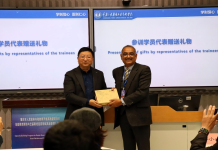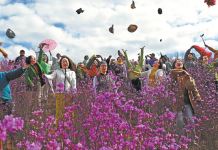YINCHUAN: At the Xiafan Village of Xinglong Township in Xiji County, Ningxia Hui Autonomous Region in northwest China, villagers have the tradition of solving disputes through friendly discussions.
Xiafan Village is now known as a model village of ethnic solidarity, with its inhabitants being half-ethnic Han and half-ethnic Hui.
“We are closely following the policy of the Party on ethnic solidarity and are working out a set of practices to solve any dispute at the earliest time, with many years of experiences at the grassroots,” said Tian Lei, Party secretary of the village.
Ethnic solidarity in Xinglong was also recorded in 1935 when the Red Army passed through Xiji’s Shanjiaji, where ethnic Hui people mainly inhabited at that time.
Now, an old courtyard house in Shanjiaji, which once hosted Chairman Mao Zedong, has become a museum greeting hundreds of thousands of visitors each year.
“Locals in Shanjiaji then welcomed the Red Army with food, tea, and other necessities, but the soldiers, abiding by strict discipline, paid all with money and refused to take anything for free,” said Ma Xiao with the local chronicles office. Ethnic solidarity has brought peace and prosperity to the area. Xinglong has a shopping street known by locals as the “Street of Poyi.” “Poyi” means married women in the local dialect. It’s named so because most of the shops are run by local married women, particularly women of the Hui ethnic group.
Ethnic clothes, delicate carpets, cosmetics, daily necessities, and different kinds of halal food can be spotted everywhere on the street, where one can feel the dynamic atmosphere of cosmopolitanism.
Zhao Ping, 54, now owns a store on the street. She used to be a small vendor, struggling to make ends meet.
“The local government has provided us with necessary guidance and subsidies to help us start our own businesses. We can run our business here with ease and expect a rosy future,” Zhao said. Abdullah Maimaiti, an ethnic Uygur food seller, has lived in Xinglong for three years with his family. His two children are attending school while he and his wife are running a store selling cakes, grapes, and other food products from Xinjiang. –Agencies






